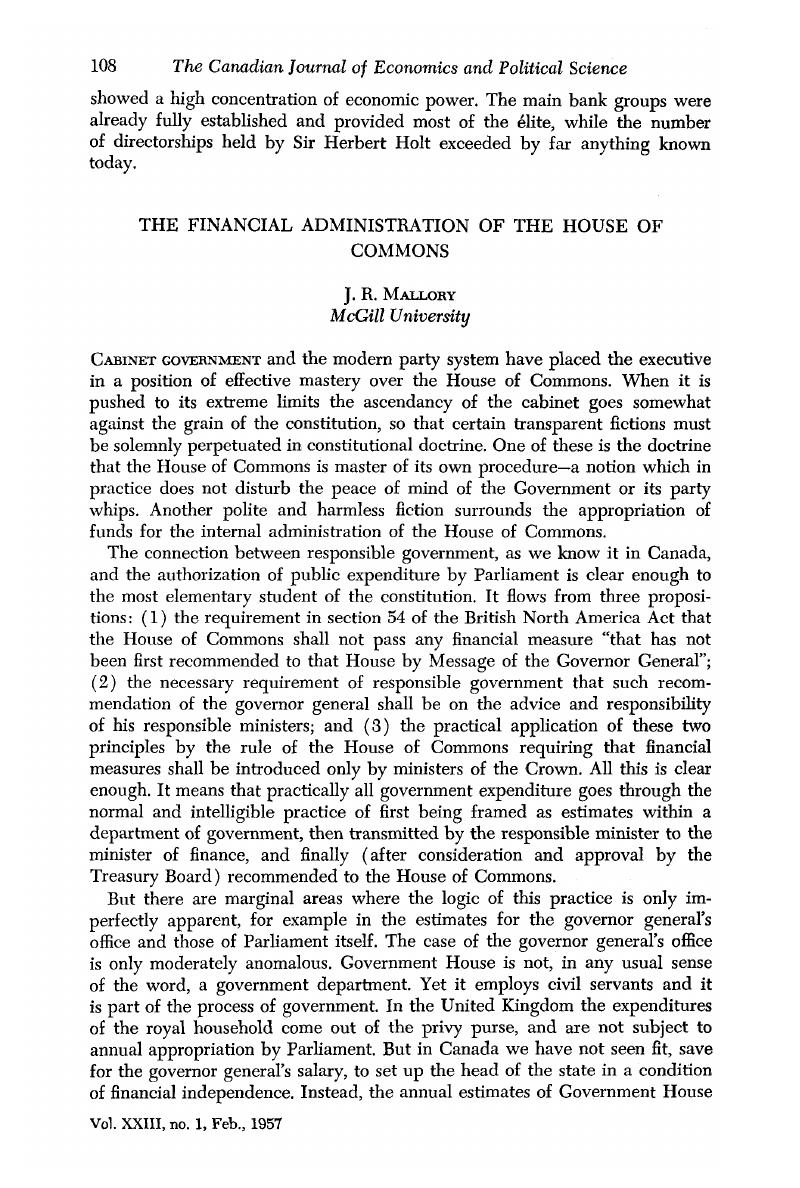Article contents
The Financial Administration of the House of Commons
Published online by Cambridge University Press: 07 November 2014
Abstract

- Type
- Notes and Memoranda
- Information
- Canadian Journal of Economics and Political Science/Revue canadienne de economiques et science politique , Volume 23 , Issue 1 , February 1957 , pp. 108 - 113
- Copyright
- Copyright © Canadian Political Science Association 1957
References
1 I am referring, of course, to the outlay for the administrative establishment of the governor general's secretary's office. The maintenance costs of Rideau Hall are part of the responsibilities of the Department of Public Works and the Federal District Commission.
2 Statutes of Canada, 31 Vict. (1869), chap. 27.
3 Thus, on June 23, 1954, Mr. Speaker Beaudoin defended and explained the internal economy estimates when questions relating to the sessional employees of the House and the provision of staff for leaders of other parties in addition to the Leader of the Opposition were raised by members. Canada, , House of Commons Debates (unrevised), 06 23, 1954, p. 6534.Google Scholar
4 Professor Ward recalls vividly to our attention Mr. Speaker Anglin: “More than once during his career as Speaker he argued with members from the Chair, or engaged in controversy from his own desk on the floor of the House. Annually, as was the custom in those days, Anglin defended in Committee of Supply the expenditures made by his office for the House of Commons, exactly as any minister defended his department. In 1877, when it was discovered that, in violation of the Independence of Parliament Act, his printing establishment held government contracts, he was subjected to examination by a House committee and subsequently his seat in Parliament was declared vacant. (That meant, as Macdonald pointed out, that technically the House of Commons had been from 1874 to 1877 presided over by a ‘stranger.’) Re-elected for his constituency between the sessions of 1877 and 1878, Anglin came back to the House to find his eligibility for re-election to the speakership ably, though erroneously, challenged by the Conservatives on the grounds that, as a new member, he had no status in the House until the result of his election had been formally announced to the House by the Speaker, that is, by somebody else. Anglin was re-elected anyway.” ( Ward, Norman, “The Formative Years of the House of Commons, 1867–91,” this Journal, XVIII, no. 4, 11, 1952, 439.Google Scholar)
5 London, H.M.S.O., 1954.
6 Letter to the author from Sir Charles MacAndrew, M.P., the Chairman of Ways and Means.
7 These matters were dealt with by the Legislative Assembly of the province of Canada through the Standing Committee on Contingencies, which was set up each session, beginning in 1841. The Journals show that the Committee dealt with such matters as the salaries of the officers of the House, the pay of translators and messengers, as well as the library and related matters. A Standing Committee on Contingencies was set up in the first session of the federal Parliament, but not thereafter. As noted above its functions were assumed by the Internal Economy Commission. I am grateful to Professor J. E. Hodgetts for drawing my attention to the functions of the Committee on Contingencies.
8 “The Formative Years of the House of Commons,” 440.
9 For an account of how Mr. Speaker Sproule requested Sir Robert Borden to institute an investigation into the office of the Clerk of the Crown in Chancery, see Mallory, J. R., “The Clerk of the Crown's Tale,” Canadian Bar Review, XXXIV, no. 1, 01, 1956, 60–8.Google Scholar The events of the 1956 session throw a strong light on the difference between the office of speaker in Canada and in the United Kingdom. Some of these questions are discussed in Mallory, J. R., “Parliament and Pipeline,” Canadian Bar Review, XXXIV, no. 6, 06–July, 1956, 714–30Google Scholar; Eugene Forsey, ibid., XXXIV, no. 7, Aug.-Sept., 1956, 880–2; Sir Cecil Carr, ibid., XXXIV, no. 9, Nov., 1956, 1100–6.
- 1
- Cited by




